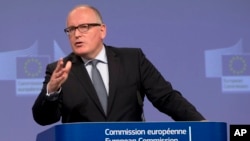The European Union says Poland's government is not following the rule of law as required by the bloc's membership and has taken a step toward sanctions, a senior EU official said Wednesday.
The European Commission has sent a critical opinion to Poland's conservative government about its actions, which have paralyzed the country's Constitutional Tribunal, EU Commissioner Frans Timmermans said. The move is considered a warning for an EU member to address the concerns and prevent more serious steps from being taken, such as stripping Poland of its EU voting rights.
“We've not been able to find a solution to the issues at stake,'' Timmermans said in Brussels.
The EU move comes after months of unsatisfactory negotiations with Warsaw and brings the standoff closer to punishment. Poland, which has two weeks to respond, could face the first-ever sanctions against any EU member under the new “rule of law'' procedure.
“We hope [the opinion] will help focus our dialogue with the government of Poland on issues that we believe need to be solved to get out of the conflict surrounding the Constitutional Tribunal,'' Timmermans said.
The EU has had similar issues with Hungary regarding some legislation seen as symptomatic of backsliding on democratic values.
But after prolonged legal wrangling and some amendments made by Hungary, the issue subsided with no sanctions on Budapest.
EU concerns
The EU is concerned about Polish government's refusal to accept the appointment of some new judges to the tribunal, over new rules governing those appointments and over the government's refusal to publish and implement some of the tribunal's rulings.
Actions by Poland's right-wing Law and Justice government, which took office in November and says it is protecting Poland's sovereignty within the EU, have led to massive street marches by some Poles in defense of democracy.
Poland's response
Government spokesman Rafal Bochenek expressed hope Wednesday that a continuing dialogue with the 28-nation bloc and with opposition lawmakers at home will help “cut short this dispute very soon.'' But the opposition says there are no such talks.
Polish Deputy Foreign Minister Konrad Szymanski said both the EU and Poland's government want to end the dispute over the country's top court. But Szymanski said “regardless of the Commission's opinion, we will present our own solutions,'' which he did not describe.
Timmermans tried to soften the blow by saying he's still in “constructive dialogue'' with Polish Prime Minister Beata Szydlo, but he stressed that the European Commission is obliged to make sure that all of the bloc's members follow EU rules.
A European body of legal experts, called the Venice Commission, has also urged Polish lawmakers to find a lasting solution to the court dispute.
